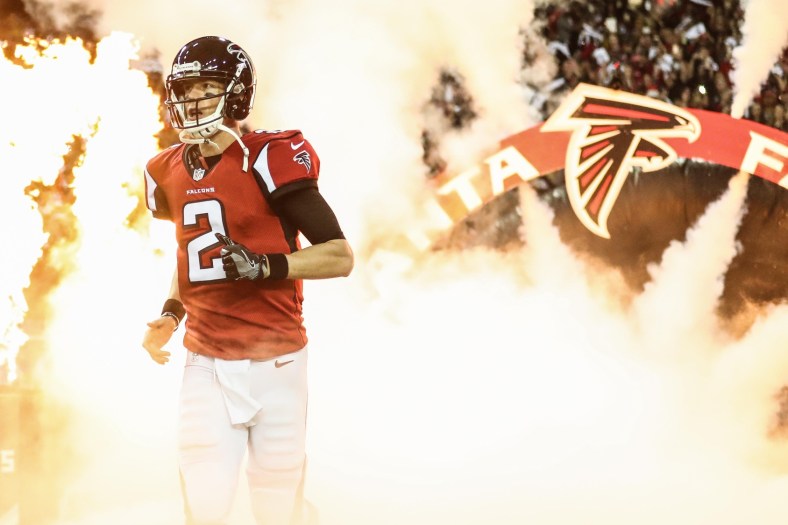
Every Atlanta Falcons article written since February 8 starts the same way, so let’s be a little different here and not harp on the Super Bowl. The Falcons were up 28-3. They lost. It was bad. The Falcons will have to overcome it psychologically. Everything that needs to be said about it for the purposes of this season has already been said.
Atlanta brings back most of the same cast in terms of personnel. The two biggest changes coming on the sideline, where former USC head coach Steve Sarkisian takes over for Kyle Shanahan as offensive coordinator and Marquand Manuel, the defensive backs coach last season, replaces Richard Smith as defensive coordinator. Because the Falcons promoted from within on the defensive side, not much is expected to change.
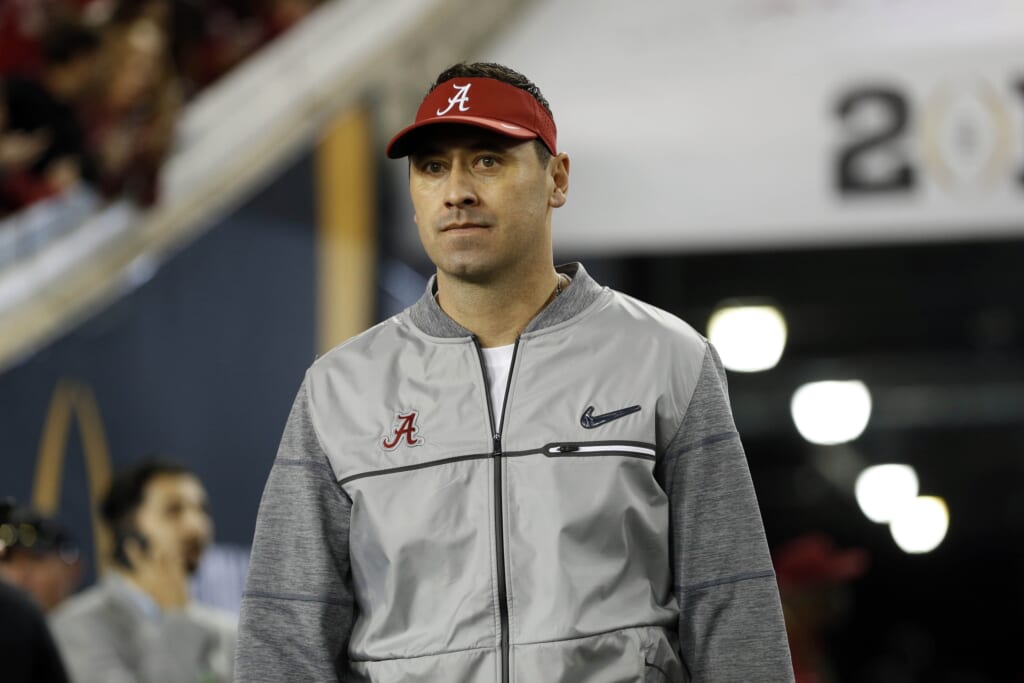
However, Sarkisian was an out-of-the-box hire to replace Shanahan, the man given credit as the creator of Atlanta’s top-ranked offense last season.
To an extent, it’s unlikely Sarkisian changes everything because there’s not really any reason to do so after last season. However, this is an interesting test for someone who hasn’t coached in the NFL since 2004, when he was the quarterbacks coach for the Oakland Raiders. He left the USC job while struggling with alcoholism in 2015, and was the offensive coordinator at University of Alabama for all of one game before leaving. That’s not to cast doubt on Sarkisian’s coaching ability, but it’s just impossible to know what to expect.
Luckily for him, Sarkisian is working with one of the most-talented offensive groups in football. Quarterback Matt Ryan is coming off a career year in which he won the MVP. Ryan isn’t quite as good as that sentence may have you believe — this was the first time he had put up an MVP-caliber season. But he did lead all quarterbacks in DYAR, DVOA, QBR, and adjusted net yards per attempt while leading the entire league in approximate value. Some regression seems likely, but Ryan is still one of the better quarterbacks in football.
Playing no small part in his incredible 2016 was the supporting cast the Falcons gave Ryan. At receiver, Julio Jones led the position in DYAR and ranked second in DVOA. Jones also went for 1,409 yards on 83 catches, both of which were somehow his lowest marks in the past three seasons.
Taylor Gabriel came out of nowhere as the No. 2 receiver the Falcons hadn’t had since Roddy White was at the end of his peak. Gabriel led all receivers in DVOA and established himself as the league’s premier receiver when it comes to yardage after the catch, averaging 7.7 per reception, according to Football Outsiders Almanac.
Mohamed Sanu is a steady third option and ranked 36th among receivers in DVOA last season while going for 653 yards. Even tight end Austin Hooper, who had just 27 targets, was absurdly efficient with a 47.1 percent DVOA.
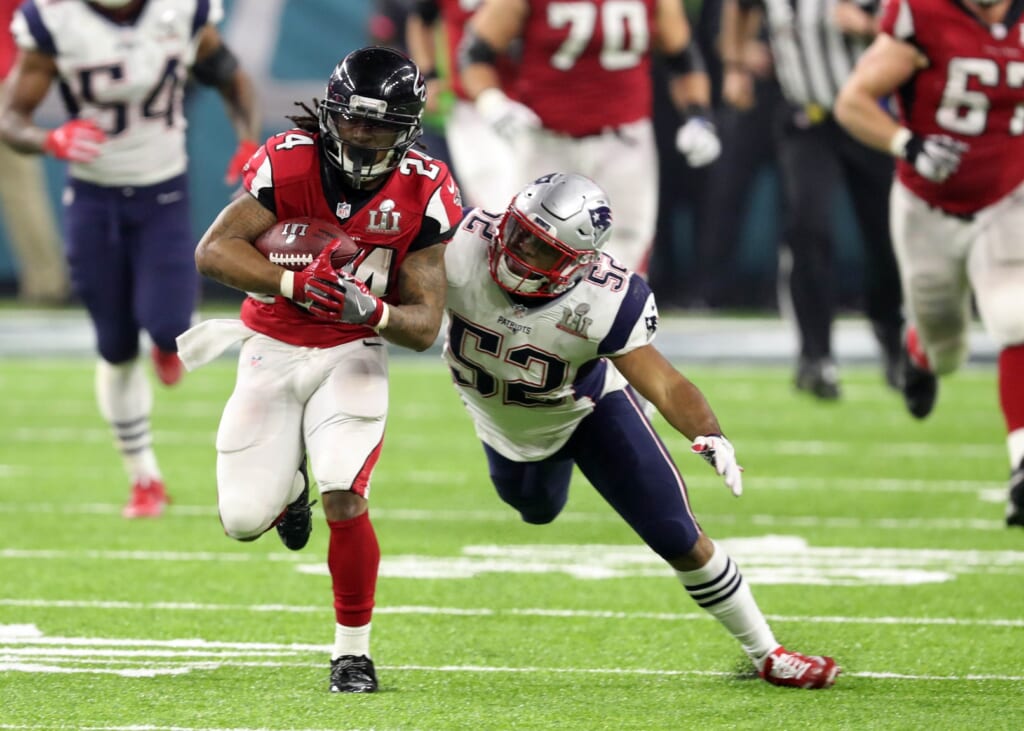
Devonta Freeman and Tevin Coleman formed a running game that ranked seventh in DVOA last season. Freeman went for 1,079 rushing yards, averaging out to 4.8 per carry, and ranked 12th among running backs in DYAR. Coleman had 520 yards of his own and both were serious threats in the passing game.
A huge part of Atlanta’s offense last season was splitting one or both running backs out wide and wreaking havoc. The two combined for 85 receptions and 883 receiving yards last season. As a point of comparison, that’s more production than Cole Beasley, Jamison Crowder, Alshon Jeffery or Allen Robinson had last season in the receiving game.
Atlanta’s offensive line brings back its four-best starters from last season as well. Center Alex Mack ranked fourth at his position in PFF grading and was the catalyst for Atlanta’s success as a zone-blocking team in the run game. He blew just four run blocks last season, per FOA. At right tackle, Ryan Schraeder should be earning more recognition as a star after last season, in which he had an 87.2 PFF grade.
Jake Matthews, the left tackle, has established himself as a solid player, despite not yet living up to his draft slot. However, Matthews has shown real growth since 2014 and at age 25, there’s still time. Left guard Andy Levitre ranked 13th at his position with an 83.1 PFF grade last season. Most importantly, these four guys have played together and built cohesion.
The only exception is left guard Ben Garland, who steps into Chris Chester’s spot at right guard. Garland was on the Falcons last season but played just 52 snaps and has never started despite being in the league since 2012.
With expected regression from Ryan and a transition from Shanahan to Sarkisian, it’s unlikely the Falcons finish first in offensive DVOA again. However, this is still one of the best units in football and will give Atlanta a good chance to win the NFC South.
Defensively, the Falcons aren’t going to wow anybody, but this group was good enough to get the job done last season and will likely improve. The most obvious reason for improvement is cornerback Desmond Trufant’s return from injury. Trufant played just nine games last season before going down, but was true to form, giving up just 6.1 adjusted yards per target according to FOA.
Atlanta managed to survive without him. But now that Trufant is back, they have someone who they can trust to shadow just about any receiver in the league.
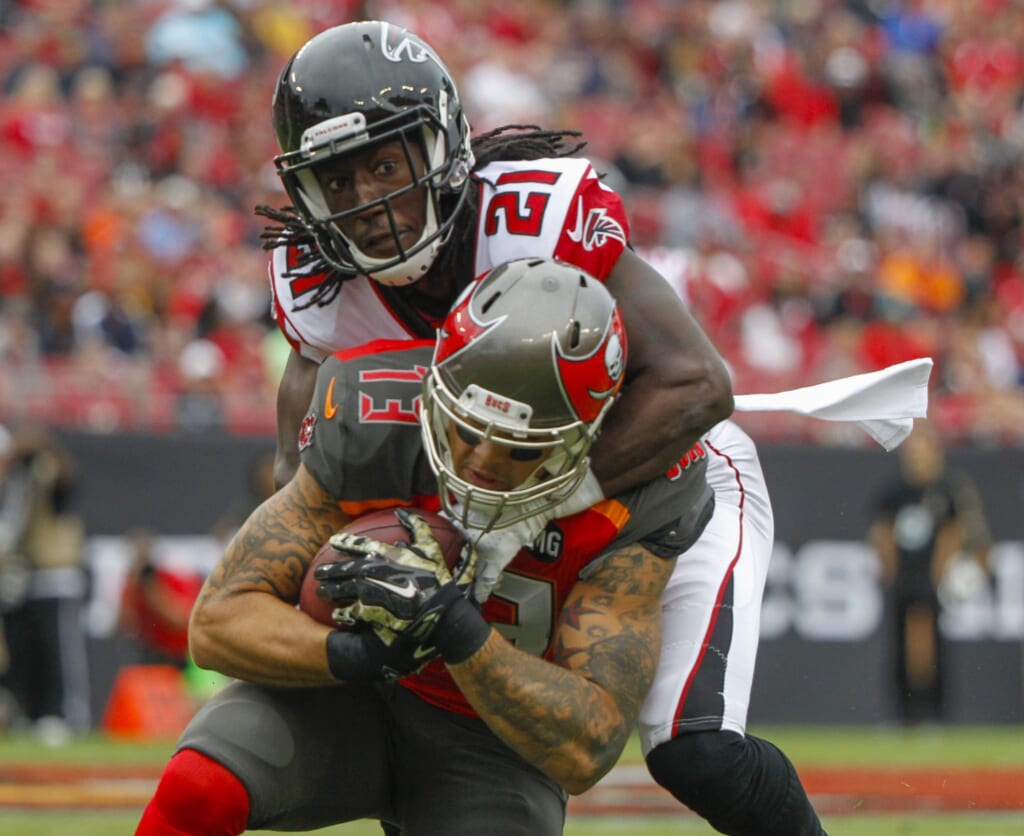
Trufant’s impact is even bigger in the wake of a 10-game suspension being handed down to Jalen Collins, who was the No. 1 corner by default when Trufant got hurt. The Falcons have enough depth at the position that Collins’ suspension isn’t a huge deal.
Robert Alford is solid on the outside, posting a 75.6 PFF grade and 50 percent success rate last season, per FOA. Brian Poole came out of nowhere and played well at nickel back, averaging just 7.2 adjusted yards per target, according to FOA.
Safety Keanu Neal, a rookie last season, will likely get better as well. Neal had a good rookie year, ranking seventh at the position with 6.3 adjusted yards per target. With some improvement in run defense, he could easily turn into a star. Next to him, Ricardo Allen’s 81.8 PFF grade was 25th among safeties last season.
At linebacker, the Falons are young. Deion Jones and De’Vondre Campbell are both in their second seasons and had successful rookie campaigns. Jones made the All-Rookie team and got some buzz for Defensive Rookie of the Year, ultimately losing out to Joey Bosa. But he does look like one of the better coverage linebackers in football. He ranked eighth at the position with 4.8 adjusted yards per target and had a solid 49 percent success rate, per FOA.
As for Campbell, his numbers were pedestrian by comparison, but the Minnesota product can play. He averaged 3.0 rushing yards per tackle, according to FOA, as well as a solid 6.3 adjusted yards per target. The third linebacker spot isn’t one of importance — the Falcons, like most teams, rarely play in their base defense, doing so just 19 percent of the time, per FOA.
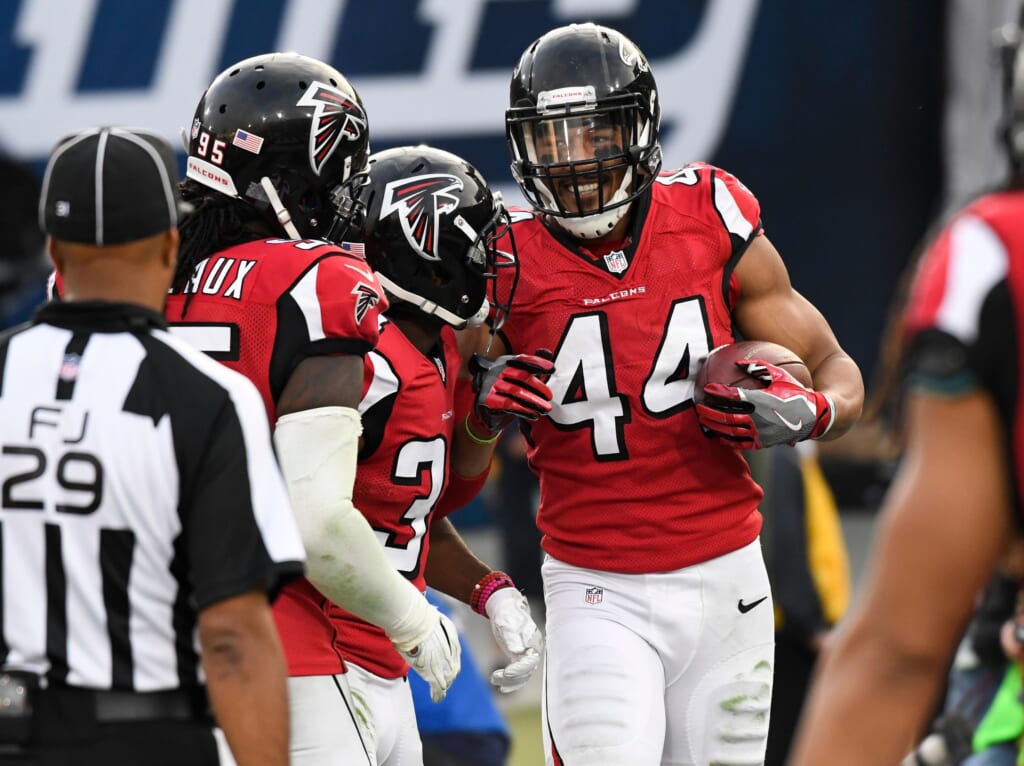
However unimportant it may be in the grand scheme of things, that third linebacker spot is certainly one of interest. Assuming we’re counting Vic Beasley, a dominant pass rusher, as a defensive end, that spot could belong to anyone from Kemal Ishmael to third-round pick Duke Riley. Whoever wins the job, it could end up being a weak point in this defense.
When it comes to the front four, Beasley is the star. The 25-year old broke out last season with 15.5 sacks, five hits and 38 hurries. The sack total may regress a bit, but make no mistake: Beasley has established himself as one of the league’s best pass rushers.
Across from him, the Falcons spent a first-round pick on UCLA product Takk McKinley, who figures to see the same rotational pass rushing role as Beasley. McKinley had 9.0 sacks, 11 hits and 37 hurries at UCLA last season, per PFF, and figures to be one of the better pass rushers to come out of this class.
On early downs, Adrian Clayborn and Brooks Reed will see some playing time. The two had run stop rates of 73 and 75 percent last season, per FOA, both solid numbers.
Atlanta’s prowess against the run comes largely in the middle, with Grady Jarrett, who averaged 2.2 rushing yards per tackle, according to FOA. Jarrett is only 24 years old and in addition to being a good run defender, took steps as a pass rusher last season, putting up 3.0 sacks, seven hits and 20 hurries, per FOA. Next to him, newly acquired Dontari Poe will get the bulk of the snaps. Poe is overrated, but a fine player nonetheless after posting a 74.2 PFF grade last season.
This defense won’t win games for Atlanta, but it’s good enough. Assuming the transition to Sarkisian isn’t messy, the Falcons are going to put a lot of points on the board — enough to win most weeks — and look likely to win the NFC South. From there, a return trip to the Super Bowl isn’t out of the question.